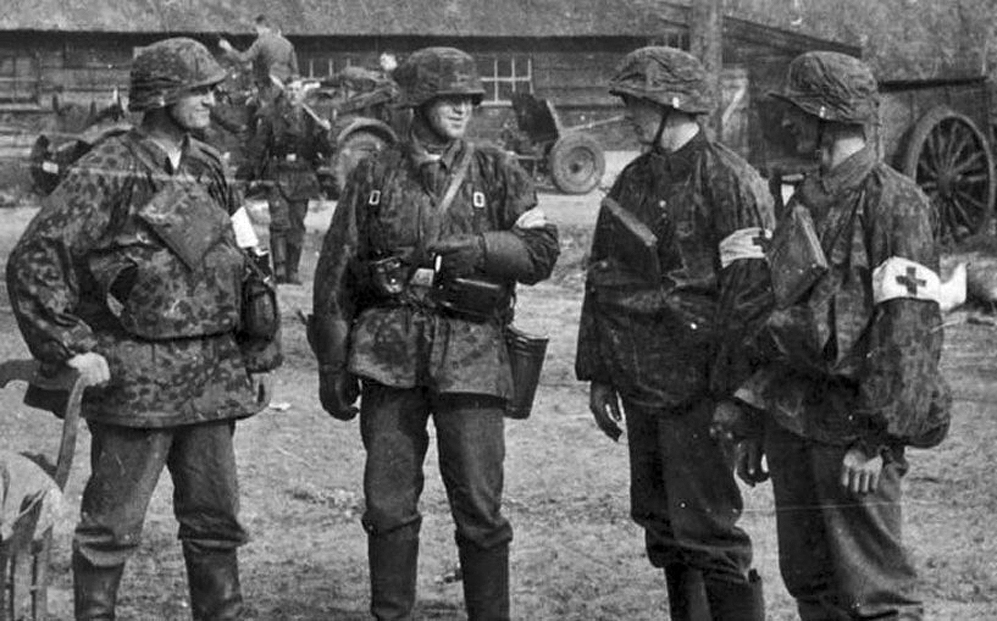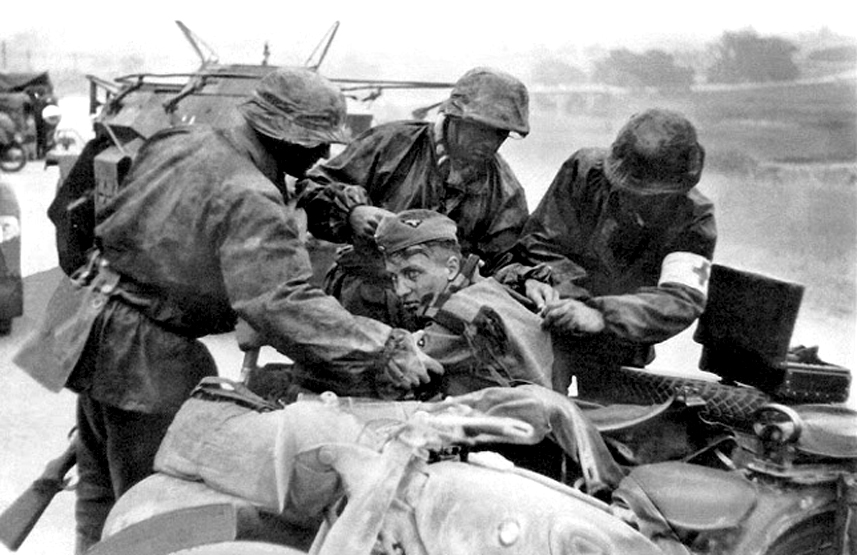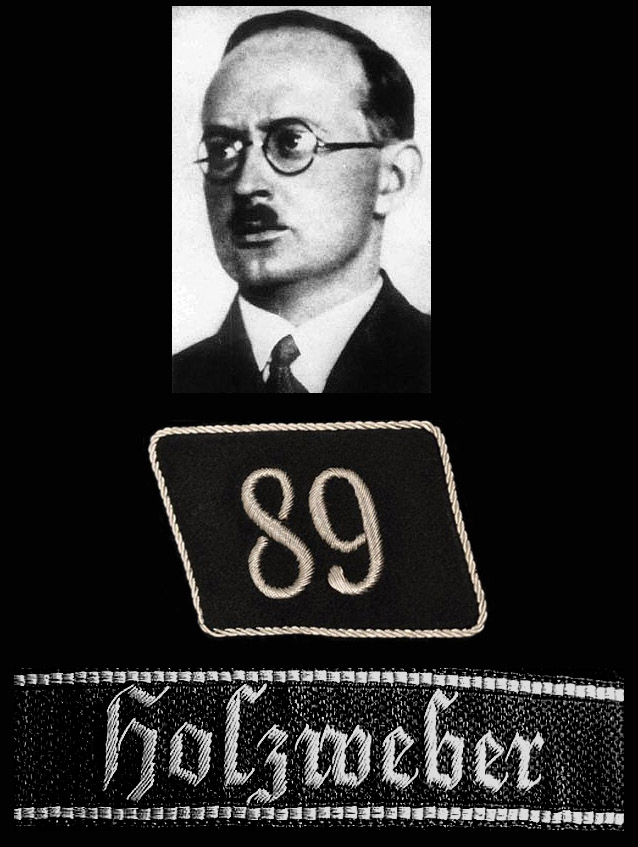
Interview with Karl Vacha, SS medic, Blood Order winner. Vienna, 1983.
[Above: Four Waffen-SS medics during a quiet moment.]



Interview with Karl Vacha, SS medic, Blood Order winner. Vienna, 1983.
[Above: Four Waffen-SS medics during a quiet moment.]


Karl: Yes, it is simple; I was a party man here in Austria when it was not easy to be. There was a lot of trouble for us made by the communists, Jews, and other democrats. I had heard the Führer speak once in Munich and heard his call to action. We in Austria viewed ourselves as the same tribe as the Germans. I understood like many that we needed to be united as one people to fight the growing menace of Marx and his followers. Europe was different back then, they wanted violent revolutions to overthrow the old ways, which were decayed. The NSDAP wanted to stop the decay, and end the threat of Marxists. I came back here and went to work with many other comrades to fight the evil that was here. We had success as our people could see what was happening and that they were being plundered. When the NSDAP came to power in Germany we knew our time was coming, and our ranks grew. At times there had to be violence and I will tell you it was always instigated by the reds and their Jewish masters. This caused some of us to be locked up for our politics, but never the reds or Jews who started it. We would march to show solidarity, they would come out to attack us with bottles, bricks, or whatever they could find, and we got arrested.
It became so bad that some in the 89th acted with SA comrades and took matters into their own hands. This may have been brash and untimely, but it did let our enemies know we would go to great danger to achieve victory. We wanted victory, even if it meant deposing the corrupt to achieve it.
It was during my time in confinement I learned about the SS and how it was a growing force in the new Reich, and very loyal to the Führer. I knew that someday I wanted to join. I was told they were very selective, but I had no doubt I could get in.
I kept in touch with comrades throughout and even received visits from comrades from the Reich. They brought greetings and encouragement. The guards were mostly sympathetic, since we were political prisoners. They kept the criminals away from us and allowed us to have good reading material.
My course was set, I could see clearly that victory would be ours and our days of torment would be over. The winds of political change could be seen by all. More and more fellow countrymen came to see the NSDAP as the answer to the problems facing us. In 1938 the issue was decided when the union with the Reich was achieved.
This made it possible for me to volunteer to the SS here in Vienna; I was appointed into the 89th [89. SS-Standarte Holzweber. This was an honor title for Franz Holzweber, one of the SS men who assassinated the scheming and corrupt leader of Austria at the time, Engelbert Dolfuss, in the summer of 1934, and who was himself executed by the Austrian government. His last words were 'Heil Hitler!'-Ed.] under the command of an officer named Pinter [SS-Standartenführer Rupert Pinter was killed in the war on February 15, 1943.]. This was a very selective group and I was welcomed in. I was placed into the medical field, and sent to school to further learn. It was a good time for me. From there I went to serve in camps as a medical specialist.
I understand you are a holder of the Blood Order?
Karl: Yes I am, I was not an Old Guard however, I missed out on that. That was for the comrades who marched in 1923 to try to stop the reds, and to seize power in Munich. My award was for the time I spent in confinement. Since I was charged with political agitation I was considered a political prisoner, unfairly held for my beliefs.
When the reunion happened I was put up for the award, which the commander of my unit pushed through. I was presented with this, with my own number and entered into the NSDAP books as holder of one of these awards. I counted myself as a loyal party member who sacrificed much for my convictions.
It is because I went to jail for my beliefs instead of bending that I was presented with this. I will tell you we had a day of reckoning with our enemies as well. Most all reds were arrested and kicked out, or sent to camps for their crimes. The Jews who praised them and funded them all fled. It was in those days Austria became a blessed nation again, we removed the pests within us. Back in those days bearing this award was not a shameful thing, it was looked upon with honor. I will take that honor to my grave, you can be assured of that. That is nothing anyone can take away from me.

[Above: A wounded SS warrior being treated by an SS medic.]
I understand you were on the medical staff of the SS, and worked in the camps. Can I ask what it was like for you?
Karl: Yes, I must of course watch what I say; one can get into trouble for telling the truth now. I was sent after training to the Sachsenhausen camp in Oranienburg, right outside Berlin. This is the camp where many famous people were held so you could say I was in a famous camp.
I will first tell you something, the people in the camps were there for breaking laws, or for protective confinement. I remember there were many reds and their supporters there. That bastard Jew Grynszpan [Herschel Feibel Grynszpan] who assassinated Rath [Ernst vom Rath] was there I remember, he sparked the riot of November 9th [1938], which I remember.
I was there and it was not anything like what they say today, some Jewish shops were attacked and synagogues burned but this was a response to many such cases of Jews carrying out terror attacks with impunity. Something I will tell you is all prisoners were treated well, even the worst.
It was forbidden to do anything to them, a guard could be sent to the front if they broke this rule. This camp was for high value prisoners so they were treated very well, and fed well. Your Allies bombed the camp often, and many prisoners died as a result, including Grynszpan.
I was not there at the end but comrades who survived said it was bad, many had to be released or transferred at the end. I will say I do not believe what they tell you about these camps, the prisoners were well looked after and not abused. The only cases I saw were other prisoners, the criminals, doing it. They were punished.
These tales they tell us today are nonsense, made up in the minds of sick people who want to promote shame and hate against us. If these camps, all of them, were really to kill people they would not have had medical personnel like me in there. We had doctors and nurses on staff at every camp, even in the east.
We had to care for them to make sure there was no sickness and if so treat them. They had a good time in these camps, as best they could. They played sports, did chores, had plays and musicals. Locals were asked to donate used items to them so that they had things to pass time.
They had visitors, mail, and money to spend. In some ways they lived better than we did. They had their families with them and lived in comfortable barracks that could be decorated as they saw fit. That was my experience that I saw.
Himmler also had many prisoners released at the end in buses sent by the Swedes and others. He did this to try to show the Allies there was nothing to hide and nothing bad had happened. You will never hear of this as it disproves the tales they spin. My friend told me all about it, how they had to just let all these prisoners go. Spies, terrorists, fraudsters, and thieves all just walked out to freedom.
Can I ask what you think of the Allied claims that the SS was a criminal organization?
Karl: Yes indeed, I can tell you it is shit. I served as a loyal soldier who lived through hell due to the hate of the Allied nations. I saw my nation bombed relentlessly, with countless civilians murdered. When the Russians came they had great evil with them, and killed millions.
The tales told of killing war prisoners or civilians by our men is false. If they were killed it was likely due to some action they initiated. We did have to carry out reprisal actions, I know this, but they were in response to something. Even terrorists who made it to the camps and who were shot were done so in reprisal to a first act.
The Allies executed our prisoners and spies, so in turn we had to do the same to theirs to slow it down. I have spoken to comrades who had to do this, and they confirmed it was a reaction to something the Allies did. I do not know of any illegal killings that were ordered.
I know here in Austria some civilians were hung by the Allies for attacking downed airmen, but consider the anger they had. Seeing innocent women and children killed by these butchers would make anyone snap. As for soldiers, war is war, killings happen, and one soldier's wrong does not make the whole army bad.
There was no policy of the state to kill anyone, but the same can not be said regarding the Allies. They went to war with orders to kill women and children. Because this may have caused some to break down and do things they regretted later, this is not an indication of the whole. I know I will stand innocent at the judgment seat, as well as all of my comrades.

[Above: Franz Holzweber, martyr of the Austrian Putsch, with honor cuff title and 89th collar tab.]
Back to Interviews